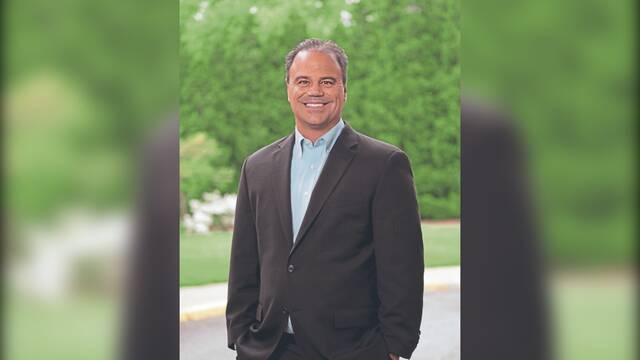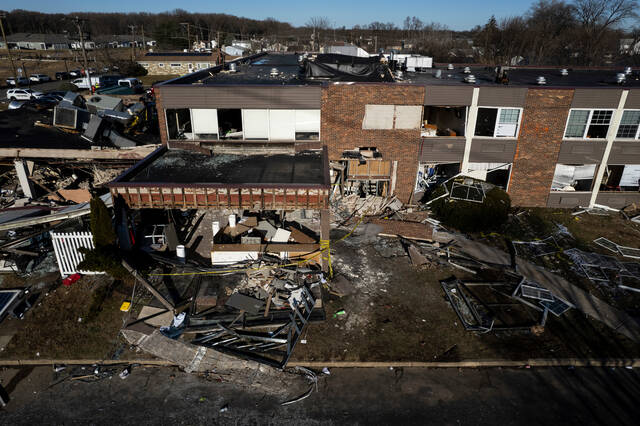Despite covid-19 surging throughout the country, and with health experts warning of challenging weeks ahead, Penn State announced Thursday night that it will start the spring semester in person, as planned, because it feels it can do so “safely but carefully.”
Still, according to the university, conditions around University Park and the commonwealth campuses will continue to be closely monitored — and, if necessary, those plans could be altered. Additional safety protocols might also be announced in the coming weeks.
Spring semester classes start Jan. 10.
“Our students, faculty and staff have a very high vaccination rate, we are testing weekly those who are not vaccinated and we are continuing to require face masks to be worn indoors,” Penn State President Eric Barron said in a written statement. “With these measures in place, together with hospitalization data and what we are learning about omicron, we believe we can safely, but carefully, return to on-campus classes and activities as planned.”
Penn State’s announcement came about seven hours after the University of Pittsburgh said its first two-and-a-half weeks of classes would be held remotely due to the spread of the omicron variant. PSU students and families were told, two weeks ago, to expect an announcement on Dec. 30 — and then waited impatiently until officials announced their decision just before 8 p.m.
In a news release, Penn State explained it has been monitoring local hospital capacity along with the spread of the omicron variant at the local, state and national levels. But, over the past week, covid-19 has seen record-breaking cases at every level.
Pennsylvania set a record Thursday with 19,436 new daily positives, breaking the record set Wednesday by 1,916 cases, nearly an 11% increase. During the past week, Centre County also saw its second- and third-highest single-day case totals since the pandemic’s start — with 234 and 255 cases, respectively — by finishing behind the record of 302 cases, set on Dec. 11, 2020.
Nationwide, the numbers didn’t fare any better. Based on seven-day moving averages, media outlet Reuters confirmed Thursday the U.S. had set another record for average daily cases with more than 290,000. (Exactly one month ago, the daily total stood around 80,000.)
“We are going to see the number of cases in this country rise so dramatically, we are going to have a hard time keeping everyday life operating,” Dr. Michael Osterholm, an infectious disease expert at the University of Minnesota, told MSNBC.
Based on advice from Penn State’s covid-19 Operations Control Center, Penn State leadership determined conditions do not warrant a move to remote learning. In an email, a university spokesperson said no officials would be available to speak with the media Thursday night due to the university’s winter break.
Last fall, without the vaccine, Penn State was forced to temporarily move to remote learning as weekly on-campus cases approached 700. This past fall, with a reported 89.8% vaccination rate, there were never more than 200 weekly cases. Still, the status of Centre County’s lone hospital, Mount Nittany Medical Center, has remained a serious concern.
Although hospitalizations have gradually decreased this past week, to 43 covid patients Thursday from an average of 57 this month, hospital officials have continued to call on community members to get vaccinated and wear masks — especially considering increased hospitalizations usually lag several weeks behind increased cases.
“The omicron variant is two to three times more transmissible than the delta variant,” Dr. Upendra Thaker, Mount Nittany Medical Center chief medical officer, said in a written statement. “There are also a high number of people who are asymptomatic, or have minimal symptoms, which creates a perfect storm for spreading the virus unknowingly. We do anticipate an even greater increase in cases following the holidays with more hospitalizations to follow.”
Unlike the fall semester, covid testing for arriving on-campus students does not appear to be required for the spring. However, Penn State officials are encouraging it.
Students or employees can currently order up to 12 free, mail-in Vault Health test kits. And on move-in weekend, from Jan. 7-9, the White Building will be open for drop-in testing at University Park.
“I want to emphasize that students at all campus locations can take actions now to order a test and complete it next week to know their health status before returning to a campus,” said Kelly Wolgast, director of the university’s covid-19 Operations Control Center.
Wolgast also said Penn State planned to follow the latest guidance from the Centers for Disease Control and Prevention, which calls for isolation and quarantine protocols to be halved to five days. A number of states like Michigan say they won’t follow the CDC’s relaxed advice, which CNN reported took a number of health officials by surprise.
Wolgast said the university has “ample quarantine and isolation space for on-campus students.”
Overall, Penn State ended its Thursday announcement by framing its decision as being similar to others in the Big Ten.
“While conditions vary by region and community, at this time, Penn State’s action is consistent with that of about half its Big Ten peers,” the university announcement read.
For more information on Penn State’s response to the pandemic, go to virusinfo.psu.edu.








